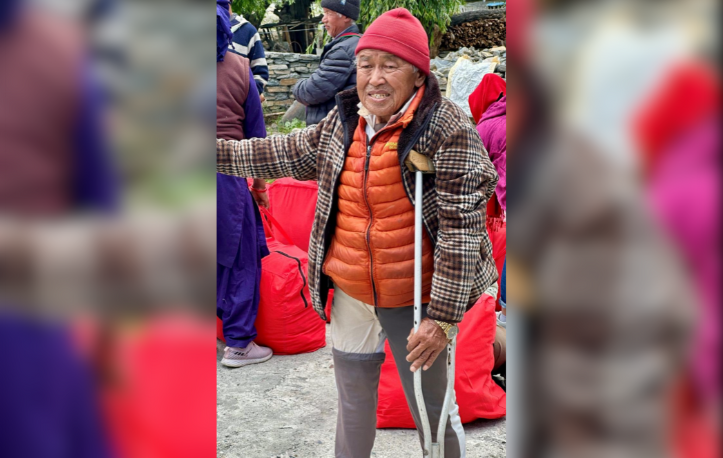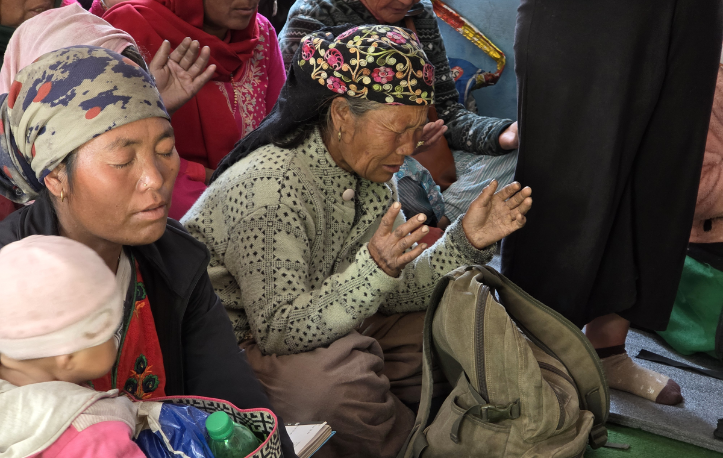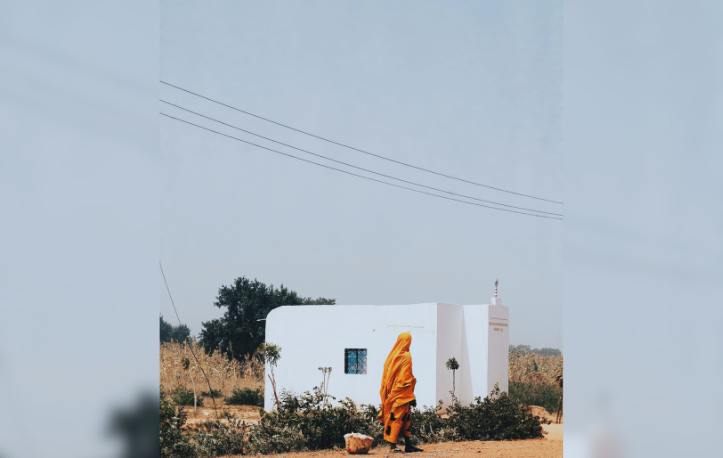On Sunday, 5 December 2021, police and members of a radical Hindu group entered Pastor Sawan’s church, detaining Sawan and a church elder for questioning. A local Hindu priest had apparently complained that Sawan had tried to forcibly convert him to Christianity.
When Sawan’s wife and four other church members went to the police station later to see why the men had not yet been released, they were also detained. After 45 days, the police released all of the Christians except Sawan, who was left to endure the jail’s poor conditions. He was denied access to a Bible, and when he became sick, he was transferred to a government hospital, where authorities chained one of his legs to his bed.
Despite the hardships, Sawan made the best of his time in custody. Though he had no Bible, he still meditated on verses he had memorised. During morning recreation time, he shared the gospel with other prisoners.
“I shared the love of Christ and prayed for them,” he said. “I was praying a lot during my time in prison, and I was able to bring four inmates to Christ.”
As Sawan’s family awaited his release, their debt from legal fees grew with each new petition. Although they struggled with resentment, they kept their eyes on the Lord.
“When both of my parents were in jail, I felt alone,” said Sawan’s son Samuel, who at age 23 had to care for his three school-age siblings. He said he tried to stay strong in front of the younger children so they would not be afraid, but in private he cried and prayed, wondering how he could help his parents and provide for the children. “I was troubled,” he said, “but deep inside I had trust in God. I had confidence that God will be working and was asking that His will be done.”
It was nearly 10 months before Sawan’s sixth request for bail was granted, in September 2022. Though his accuser eventually swore before a judge that he did not file the complaint, the case has proceeded, and Sawan is at home awaiting trial.
Twelve of India’s 28 states have anti-conversion laws that are intended to eliminate Christian and Muslim — any non-Hindu — activity in the majority-Hindu nation. Radical Hindus and some government officials use these laws to persecute Christians. At the heart of the persecution is Hindu nationalism with the goal of making India a purely Hindu country.
While the specifics of these laws vary from state to state, they have three aspects in common: prohibitions against the conversion of Hindus, requirements to notify the government before changing religions and an automatic presumption of guilt with the burden of proof on the accused rather than the accuser.
The laws criminalise conversion — specifically leaving Hinduism — through force, fraud or allurement, but the definitions used are broad and vague. In Gujarat state, for example, the definition of allurement encompasses the promise of ‘divine blessings’, including salvation, forgiveness of sins and eternal life that are central tenets of the Christian faith.
At first the laws appeared harmless because they were publicised as preventing the manipulation of vulnerable people. But under these laws, a pastor can be arrested based on an unsubstantiated accusation.
While enforcement has varied from state to state, recently some have begun to apply anti-conversion laws more broadly and harshly in an effort to silence Christians’ witness.
In the past 10 years, the political victories of the Bharatiya Janata Party (BJP), which is affiliated with the right-wing paramilitary organisation Rashtriya Swayamsevak Sangh (RSS), have emboldened authorities and many Hindu groups not only to enact anti-conversion laws but also to initiate violence and other forms of persecution against Christians. Since the election of Prime Minister Narendra Modi, a BJP candidate who became a member of the RSS at age eight, the RSS has grown significantly in membership. According to a front-line worker, groups like the RSS are highly coordinated; they have contacts in every district who communicate via phone and social media to rally large mobs in opposition to Christian activity.
“Normally what happens is they hire some people who are willing to give false allegations against these believers,” said a Christian who is providing legal support in Sawan’s case.
Filing charges based on hearsay is not the only procedural irregularity occurring under the anti-conversion laws. “Before, you could be granted bail at the police station before even going to jail,” said another front-line worker helping imprisoned Christians. “The recent amendment in the anti-conversion act in Madhya Pradesh [State] changed the law so that the minimum time [served before the court can grant] bail is six months. Also, initially the fine was only 100,000 rupees [about $1,800], but now it is almost 1,000,000 rupees [$18,000]. Even a murder case does not have as harsh a law compared to the anti-conversion laws.”
Although the harsh laws and questionable procedures have made it difficult for many accused pastors and other Christians to prove their innocence, the persecution has furthered the gospel. Sawan’s son Samuel said their local church grew by more than 50% during the 10 months Sawan was in jail. Other imprisoned Christians have used their arrests to proclaim the gospel to police, prisoners and prison officials.
Pastor Rajiv is one such Christian who saw his imprisonment as a new ministry assignment. On 6 February 2022, as Rajiv’s congregation prepared for Communion, three members of the RSS entered the service and began making a video accusing the church of conversion activities. Though asked to leave, the Hindu radicals continued their disruptive behaviour.
When police arrived, they took Rajiv and another Christian to the police station. The police questioned Rajiv repeatedly about his work, even though the church was officially registered with the government and had permission to meet. Eventually, based on the RSS claims, Rajiv was charged under the state’s anti-conversion laws and put in jail.
The first two weeks in jail were a confusing time for Rajiv. “When I was a bad person [before my conversion], I was never put behind bars,” he said, “but now I had become a … follower of the living God, and I was going through so much.” Rajiv worried constantly about his family and the church.
Then his son brought him the antidote to his worries — a food parcel from his family that included a New Testament and a note encouraging him to remain faithful. While reading the New Testament in his cell, Rajiv came to a new understanding of Matthew 5:11–12, “Blessed are you when they revile and persecute you, and say all kinds of evil against you falsely for My sake. Rejoice and be exceedingly glad, for great is your reward in heaven.” His perspective shifted, and he began to find purpose in his imprisonment.
When other prisoners became curious about what Rajiv was reading, he told them he was reading about Jesus, and some became interested.
With permission, Rajiv’s son brought 60 more New Testaments to the jail, and Rajiv gave them to his fellow inmates. He started a fellowship among the prisoners, sharing the hope of the gospel with them.
“I felt comforted and confident as I continued to be there [in jail],” Rajiv said. “All this happened because Jesus loves [these prisoners] and wanted me to be His vessel in order to save them.”
Rajiv’s sense of purpose didn’t diminish the hardships he and his family faced, however. The first attorney they hired took their money without filing a single petition, and other attorneys required large fees. In addition, because of the stigma attached to Rajiv’s arrest, one of his sons lost his job and a daughter’s marriage engagement was broken.
On 24 April 2022, after several requests for bail had been denied, Rajiv was released from jail. His church remains closed until the court rules on his case, but Rajiv continues to visit and encourage church members while awaiting a verdict.
In many anti-conversion cases, someone files a complaint detailing how he or she was targeted for conversion. Front-line workers have reported that instructions for filing these claims and getting them to ‘stick’ are published on websites and social-media accounts belonging to the RSS and other Hindu extremist groups. Social media, in particular, is used by radical Hindu groups to persecute Christians. That’s what happened to Pastor Aarav.
Growing up as the son of a Hindu priest, with a temple in his home, Aarav expected more persecution from his family when he first became a Christian. But they had all witnessed his miraculous healing when Christians prayed for him, and eventually the whole family came to faith in Christ. Aarav’s father tore down the altars in their home and destroyed their idols. The family then began using their house as a church, which by 2020 had grown to about 250 members.
But their house church soon became a target of vandalism, attacks during worship services, and bureaucratic battles over meeting permits. Aarav believes these incidents are what ultimately led to his arrest on 11 October 2022.
After filing paperwork requesting permission to meet as a church, Aarav was summoned to the police station to provide his signature so the permit could be issued. At the police station, he was told to wait while they completed the permit. Instead of coming out of his office with a permit, however, an official presented Aarav with a warrant for his arrest. The police had prepared their entire case before calling him to the station, and within a couple of hours Aarav found himself before a judge, charged with converting Hindus to Christianity. He remained in jail for 31 days before being granted bail.
Several radical Hindu groups posted wildly fictitious reports of Aarav’s arrest on social media, claiming that he had been arrested in a market and had 50,000 rupees ($900) that he was using to bribe Hindus to convert. Those who knew him were bewildered by the reports.
“It was a planned plot, a total fraud against me and my once flourishing ministry,” Aarav said. The church, which had endured a steady stream of harassment, stopped meeting after his arrest, but he continues to visit believers at home to encourage and pray with them.
For months, Aarav was traumatised by the stigma of his arrest and the social media smear campaign that followed. “When a person goes to jail, he breaks,” he said. “After coming out of jail, I was petrified. I was afraid about what would happen next. People in the streets would look at me hatefully as if I was a criminal.” Hoping something good will come from his time spent in jail, Aarav is currently awaiting trial on the anti-conversion charges.
With their future freedom uncertain, these Christian leaders who have been persecuted under India’s anti-conversion laws continue to follow Christ and faithfully serve their Christian brothers and sisters.
While in prison, Aarav found comfort through contemplation of the life and death of Jesus’ disciple Stephen, traditionally considered the first martyr. “He did not blame anyone and gave his life for Jesus,” he said. “I know I am able to go on with Christ in my life. God never leaves His people. I want to feel confident as I am pulled out amidst crisis and happily concentrate in my ministry to serve God. I believe God is going to give a miracle.”
Rajiv, too, is focused on living daily for the glory of Christ. “Our lives are Christ’s, and the things that we have received are not for long, as our days on this earth are numbered,” he said. “So all of our days, we need to be faithful to Christ and live for Him.”
As Sawan expectantly awaits his trial, his youngest son reflects the family’s faithful perspective. “The Bible says we need to forgive our enemies,” he said. “We just want to follow and continue with what God calls us to do.”




Submit a Prayer